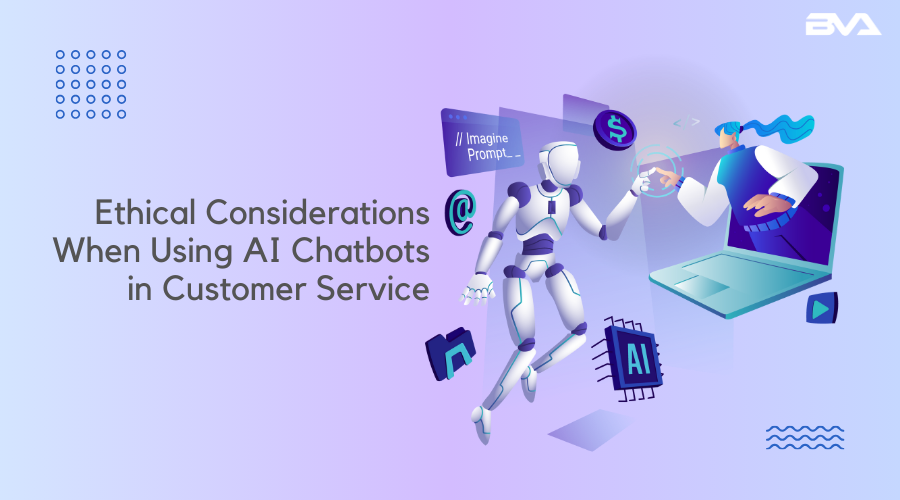In the vigorously changing digital landscape of the world, AI chatbots ethics have emerged as a game-changer in customer service. These chatbots are reconsidering customer interactions and providing a new way to satisfy customers. AI chatbots are highly capable of providing instant, quick, and on-time services based on multiple queries simultaneously.
Nevertheless, as experts have grasped and added this AI-driven transformation to the customer service sector, it has become vital to navigate the worthy ways that accompany it. This informative blog is presented to readers to provide a comprehensive understanding of responsible AI use in customer service.
AI chatbots transparency
After AI chatbot implications for customer service, it has supported increasing customer trust through transparency. It is an ethical obligation, as companies should openly tell customers that the person they are chatting with is not a human but an AI chatbot coded to bring a better experience.
AI Chatbot transparency helps customers remain clear about the nature of the interaction.
Moreover, AI chatbots should provide transparency by explaining how they use, store, and process user data.
They need to openly declare and inform users, how their information is utilized to provide better service. Through transparency, AI chatbots also let customers know the decision-making process they follow to foster trust and answer all queries for the user.

Data privacy and security
Data Privacy and & Security remained a major point of focus for companies before adding AI chatbots for better customer experience. AI chatbots are capable of easily collecting, saving, and processing sensitive and personal information about users in bulk. Sensitive data may include personal email ID, bank name, full name, and other financial details. Companies should ensure their customers that chatbots are designed to use customer personal data for the purpose it was collected with user consent and not for any illegal use.
Talking about data security, add extra efforts, robust measures, and security tools to protect this confidential data from attackers. AI chatbots must be capable of saving data from unauthorized access, breaches, or theft.
Companies must add various protection regulations, such as the CCPA or GFPR. They should also follow various protocols. The involvement of AI chatbots may cause a breach in data privacy and security. Therefore, ethical considerations are important when using AI chatbots in customer service.

Bias and fairness
Bias lets AI systems do favoritism to favor certain groups over others. This may be due to the biases added to their training data. For instance, if a chatbot is trained by adding data that involves self-opinion, then it will surely give a biased response to the customer.
Fairness adds meaning to the promise that all the AI chatbots will treat all users equally without any nepotism. So companies should train their chatbots based on the diverse training data for better hybrid customer service. In a regular audit of the AI chatbot ethics, responses should be taken to identify and mitigate biases. Companies can also add algorithms that will end or reduce bias in AI systems.

Accountability
Companies cannot trust AI chatbots completely, as they may create a blunder sometimes. Companies must add accountability principles to their policies before Involving AI chatbots in Service. It is not guaranteed that during interaction and decision-making, the AI chatbot will not create errors or cause unintended consequences.
When such an issue hinders the process, the business does not simply attribute it to machine error; instead, it should take full responsibility. Companies should address the issues, take steps to prevent them from happening again and rectify the errors. These improvements can be brought about by companies by updating chatbots’s programming and enhancing their decision-making algorithms.
While adding Accountability Principles, companies should add legal and regulatory compliance. This ensures that the AI chatbot operates within the boundaries of relevant laws and regulations. In the end, accountability is an ethical consideration when using AI chatbots in customer service. It is the responsibility of the business to remain answerable for every error created by their AI chatbots.

Maintaining human connection
Another ethic that should be added is maintaining human connection. There is no doubt that AI chatbots are efficient and capable of handling high volumes of queries. But they cannot judge and express human emotions. They cannot substitute the understanding, emotion, intelligence, and empathy of human customer service for better interactions.
So it becomes important for businesses to maintain a balance between human touch and automation for great customer experience.
This can be done before the chatbot implications by designing bots to recognize when a customer’s needs would be better met by a human representative and facilitating a smooth transition. AI chatbots should be trained to implement more human-like language and to recognize users’ emotional cues. Maintaining a human connection results in better hybrid customer service ensuring that the customers feel heard, valued, and understood.

Final thoughts
The integration of AI chatbots in customer service is proof of technological advancement around the globe. By updating the customer service business, it can enhance various aspects such as profit, customer satisfaction, and many others. AI chatbots are the needs of the future, enriching the harmonious balance of technology.
Author bio
Akshay Tyagi is a professional content writer with NetClubbed, a software development agency specializing in web design & development, and e-commerce development services. His expertise lies in crafting user-friendly content management systems that empower organizations to take control of their online content.



